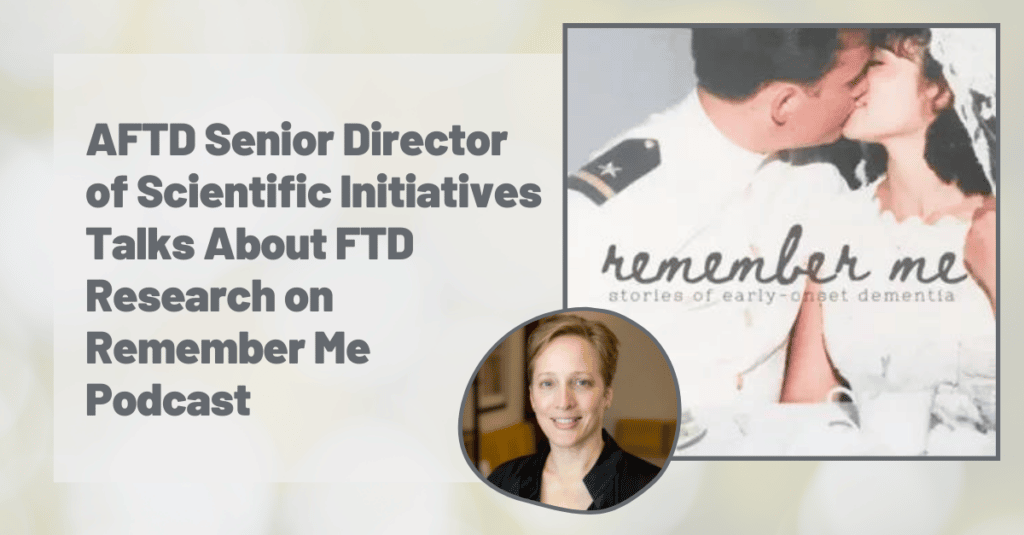AFTD Senior Director of Scientific Initiatives Talks About FTD Research on Remember Me Podcast

AFTD Senior Director of Scientific Initiatives Penny Dacks, PhD, discussed the different types of ongoing FTD research and how people living with FTD can get involved on a recent episode of the Remember Me Podcast.
Dr. Dacks told hosts Rachael Martinez and Maria Kent Beers that the most important thing people should know about the current state of research is that hope is building for effective FTD treatments. “I think it’s hard for people to see that hope when they’re on the receiving end,” Dr. Dacks said.
“Ten years ago, as an organization, we were trying to get more funders putting dollars into research and putting minds on research. Now, our limiting factor is the number of people able to participate,” she said.
The decision to get involved in research lies with the individual, Dr. Dacks stressed. Those interested in participation have a growing number of opportunities to get involved in clinical trials and other ongoing research projects.
Later in the episode, Dr. Dacks discussed genetic testing and genetic counseling, which can help people understand the risks associated with confirming one’s genetic FTD status, and explained what clinical trials are and what participation may entail. She suggested signing up with the FTD Disorders Registry to learn about potential research opportunities and help stay up to date on the latest developments, and recommended checking out AFTD’s website for more information on research involvement. Learning more about FTD research can help potential participants overcome any hesitancy they may have to get involved.
Dr. Dacks also talked about ways AFTD accelerates research, including through initiatives such as the FTD Treatment Study Group (FTSG). The biannual FTSD meeting convenes leaders in the pharmaceutical industry, academia, and government to discuss how research can best meet the needs of people living with FTD.
AFTD also kickstarts research in its early stages by providing essential support to research professionals, Dr. Dacks said. “For many years, AFTD has been trying to seed research to get work happening in this space,” she said. “In research specifically, we have funded 77 projects with $24 million since 2015. Some of that has been leverage resources from related fields, but a lot of it has been early-career support as well.”
Asked if she had any advice for people who want to stay involved in FTD research even after their loved one has died of the disease, Dr. Dacks said, “What you do matters. Every single person in this space — no matter what they’re doing — if it’s doing something related to FTD, we are still a community and we need to be together in whatever way we’re able to do so.”
For more information about participating in FTD research, watch the July 2022 webinar Clinical Trials and Beyond, co-presented by AFTD and the FTD Disorders Registry.
If you have questions about research participation or need help finding opportunities, reach out to the AFTD HelpLine at 1-866-507-7222 or info@theaftd.org.
By Category
Our Newsletters
Stay Informed
Sign up now and stay on top of the latest with our newsletter, event alerts, and more…
